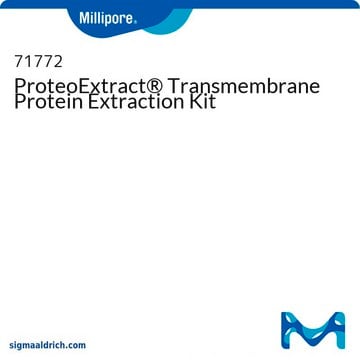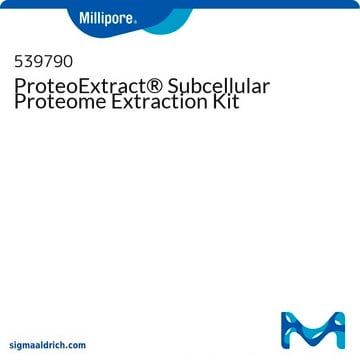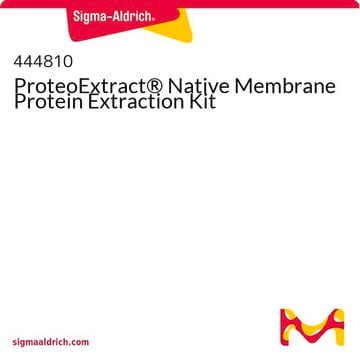Recommended Products
usage
sufficient for 200 precipitation(s)
manufacturer/tradename
Calbiochem®
storage condition
OK to freeze
shipped in
ambient
storage temp.
10-30°C
Related Categories
General description
A convenient and highly reproducible kit for the precipitation and clean-up of proteins. Yield of precipitated proteins is higher than that of traditional methods with improved solubility of the precipitated protein. Contains sufficient components to precipitate 200 samples of ≤200 µl. Requires 150 ml of ethanol (not provided). Kit delivers protein solutions of very low conductivity.
Components
Precipitant 1, Precipitant 2, Precipitant 3, Precipitant 4, Wash Solution, and a user protocol.
Warning
Toxicity: Multiple Toxicity Values, refer to MSDS (O)
Principle
The ProteoExtract Protein Precipitation Kit is designed for the concentration and clean-up of proteins from aqueous samples.
Preparation Note
• Samples: The assay will precipitate proteins from a broad range of sample types containing from 50 µg/ml to 10 mg/ml protein. The assay will tolerate chaotropes (e.g., UREA) to to a concentration of 8 M, detergents up to 4%, and salts up to 2 M.
Note: Prior to using the kit for the first time, the Precipitation Agent and the Wash Solution must be prepared and chilled to -20°C.• Precipitation Agent: 1. To one bottle Precipitant 1 add 1.7 ml Precipitant 2, 1.7 ml Precipitant 3, and 1.7 ml Precipitant 4; mix well.2. The mixture of Precipitant 1, 2, 3, and 4 is called the Precipitation Agent. One bottle Precipitation Agent (34.1ml) is sufficient for precipitation of 40 samples of 200 µl each. 3. Label the Precipitant 1 bottle after reconstitution for easy recognition.• For ease of use, store the Precipitation Agent at -20°C; reconstituted Precipitation Agent is stable for up to 2 months.• Wash Solution:1. Add 150 ml high quality ethanol (not provided) to the bottle of Wash Solution (denatured ethanol may also be used).2. Mix well and store at -20°C. Reconstituted Wash Solutions is stable for up to 1 year.Note: Each 200 µl sample requires 800 µl Precipitation Agent and 1 ml Wash Solution.
Storage and Stability
Upon arrival, all components of the kit can be stored at room temperature (20°C). For ease of use, the prepared Precipitation Agent and the Wash Solution can be stored at -20°C (see Reagent Preparation).
Other Notes
Due to the nature of the Hazardous Materials in this shipment, additional shipping charges may be applied to your order. Certain sizes may be exempt from the additional hazardous materials shipping charges. Please contact your local sales office for more information regarding these charges.
Legal Information
CALBIOCHEM is a registered trademark of Merck KGaA, Darmstadt, Germany
PROTEOEXTRACT is a registered trademark of Merck KGaA, Darmstadt, Germany
Storage Class Code
10 - Combustible liquids
Certificates of Analysis (COA)
Search for Certificates of Analysis (COA) by entering the products Lot/Batch Number. Lot and Batch Numbers can be found on a product’s label following the words ‘Lot’ or ‘Batch’.
Already Own This Product?
Find documentation for the products that you have recently purchased in the Document Library.
Konrad Pazdrak et al.
Journal of immunology (Baltimore, Md. : 1950), 186(11), 6485-6496 (2011-04-29)
The priming of eosinophils by cytokines leading to augmented response to chemoattractants and degranulating stimuli is a characteristic feature of eosinophils in the course of allergic inflammation and asthma. Actin reorganization and integrin activation are implicated in eosinophil priming by
Amy Bradshaw et al.
Frontiers in surgery, 3, 48-48 (2016-09-13)
To identify and characterize cancer stem cells (CSC) in glioblastoma multiforme (GBM). Four-micrometer thick formalin-fixed paraffin-embedded GBM samples from six patients underwent 3,3-diaminobenzidine (DAB) and immunofluorescent (IF) immunohistochemical (IHC) staining for the embryonic stem cell (ESC) markers NANOG, OCT4, SALL4
Yong Zeng et al.
Protein & cell, 8(2), 123-133 (2016-11-24)
Human monocyte is an important cell type which is involved in various complex human diseases. To better understand the biology of human monocytes and facilitate further studies, we developed the first comprehensive proteome knowledge base specifically for human monocytes by
Yong Zeng et al.
Journal of proteomics, 142, 45-52 (2016-05-08)
Osteoporosis is mainly characterized by low bone mineral density (BMD), and can be attributed to excessive bone resorption by osteoclasts. Migration of circulating monocytes from blood to bone is important for subsequent osteoclast differentiation and bone resorption. Identification of those
Ceri A Fielding et al.
PLoS pathogens, 10(5), e1004058-e1004058 (2014-05-03)
NKG2D plays a major role in controlling immune responses through the regulation of natural killer (NK) cells, αβ and γδ T-cell function. This activating receptor recognizes eight distinct ligands (the MHC Class I polypeptide-related sequences (MIC) A andB, and UL16-binding
Our team of scientists has experience in all areas of research including Life Science, Material Science, Chemical Synthesis, Chromatography, Analytical and many others.
Contact Technical Service







